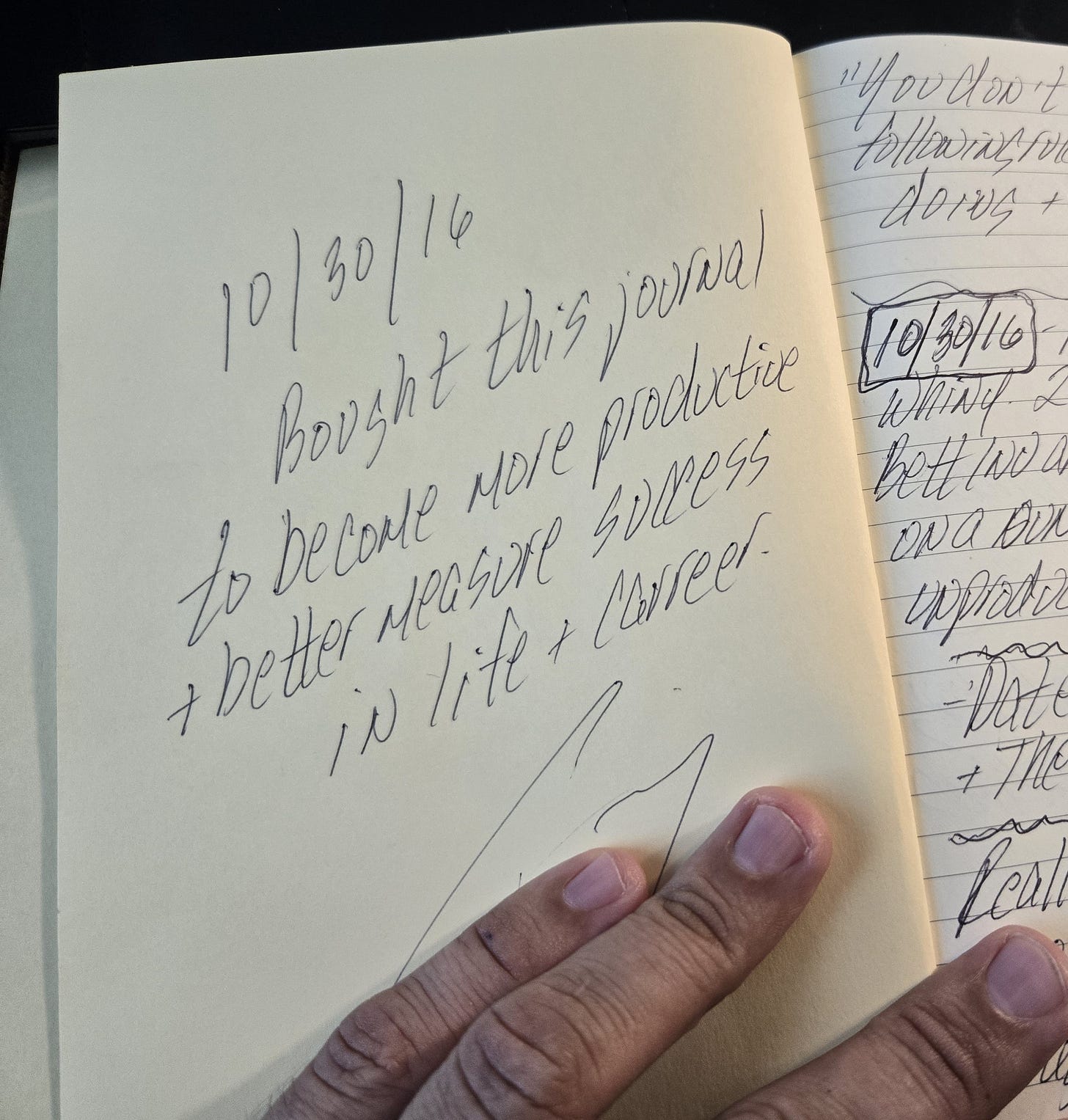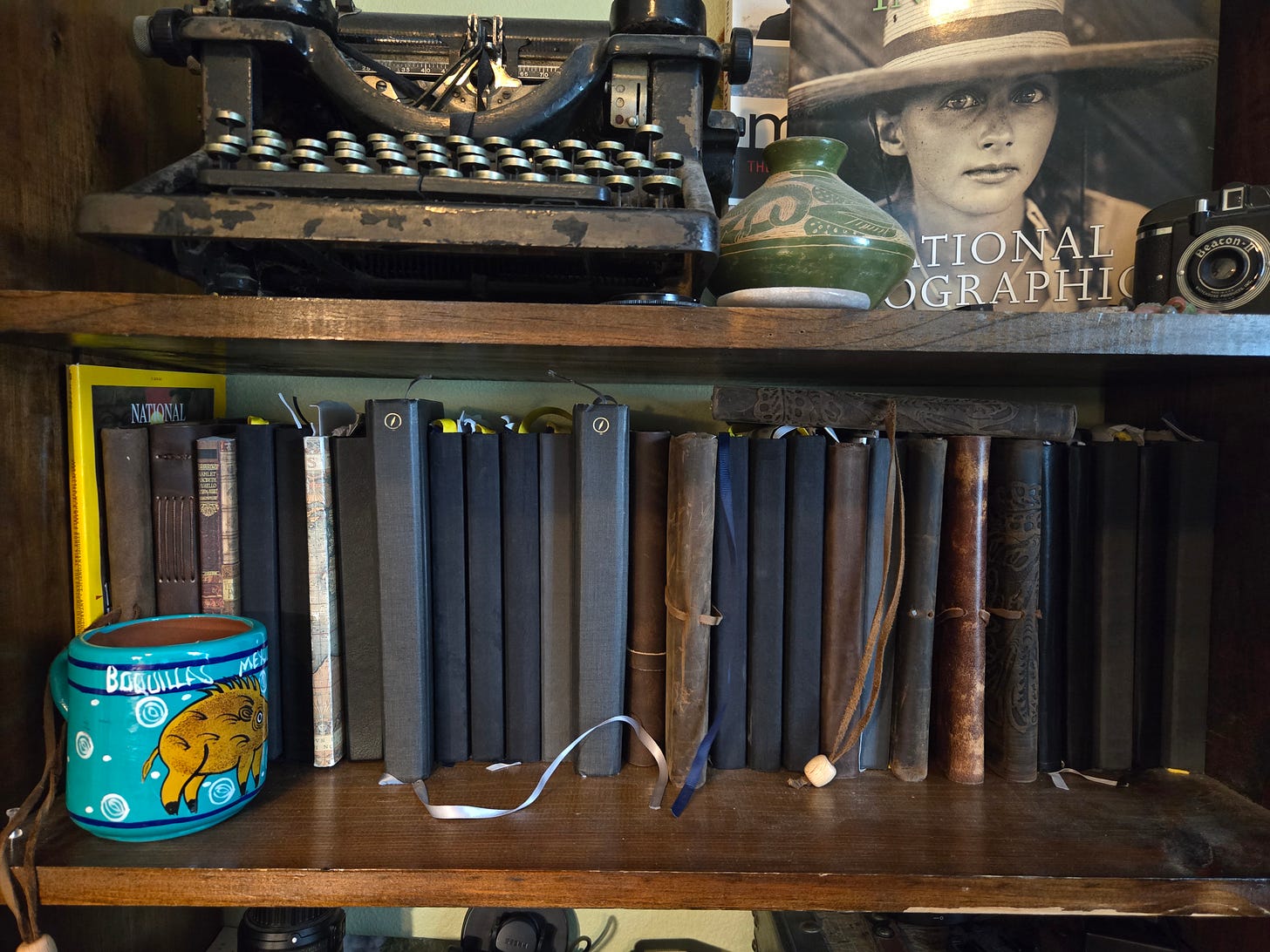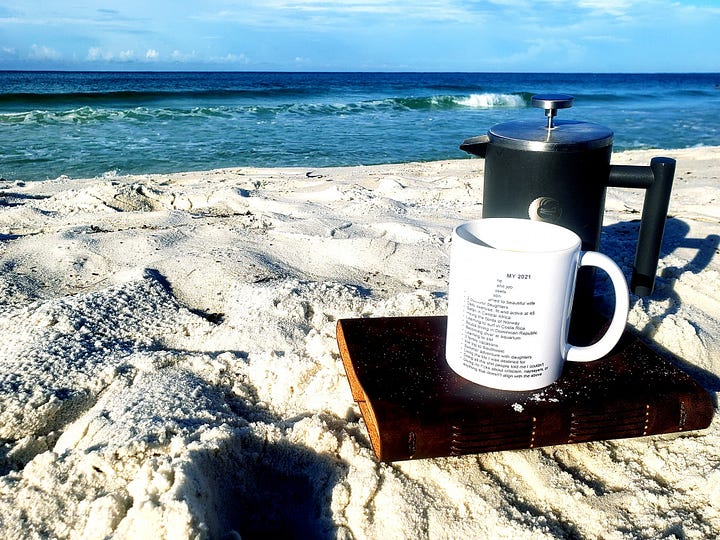Journaling: A Powerful Practice for Business, Life, and Adventure
Journaling is like a logbook and roadmap for life. While consistently writing down your intentions won't guarantee success, it will put you on a path to the life you want.
I never truly valued the power of writing down goals and affirmations until I made it a regular practice.
However, in the eight years I have been journaling, it has had profound positive impacts on my business and personal life.
My journals are living proof to myself that mindset, planning, and habits can greatly increase my likelihood of achieving the life and things that I want. Journaling enables me to create an ongoing roadmap for my life to assess where I am and where I want to go.
A Valuable Practice to Assess Your Life and Goals
I’ve been journaling regularly since October 2016. I don’t want to get too deep into my personal life, but let’s just say it was a complex and challenging time in my family, household, and business.
Unable to change my environment and certain situations, I looked to the only thing I could change and influence: myself.
So, I got deep into personal development content. One source led to another, and over the next year, I read or listened to more than 50 books and a few hundred hours of podcasts.
Dale Carnegie, Napoleon Hill, Tony Robbins, Jim Rohn, Jack Canfield, Brendon Burchard, and many others all shared one thing—they all said journaling was a powerful tool for working through your thoughts, finding clarity, setting goals, and guiding your life.
I had kept journals of my travels, but I never considered journaling in my ordinary life. Honestly, at the time, I thought the idea of keeping a journal or a diary was a practice for teenage girls to write about their feelings and crushes, not for grown men trying to achieve goals or get more out of life.
Nevertheless, I learned that many men, from Theo Roosevelt and military generals to CEOs and David Goggins, regularly journaled. They journaled not just to document things but also to help them think through situations and challenges.
So, on October 30, 2016, I bought a leather-bound journal from Barnes & Noble and started writing.

Journaling Plants Seeds and Drives Your Mindset
Eight years and almost thirty journals later, journaling has become an integral part of my life. It shapes my thoughts, outlook, and daily activities in many ways.
Earl Nightingale, an author and motivational speaker from the 1950s through the 1980s, said, “We are what we think about.” And Proverbs 23:7 in the Bible said, “For as a man thinks in his heart, so is he.” Buddha also said, “All that we are arises with our thoughts. With our thoughts, we make the world.”
I’m not a religious person, but I think there’s great merit in the idea that what you think about affects your world and creates the reality around you.
At the very least, journaling is a great platform for writing down thoughts, ideas, and notes.
But it’s far more than that. Regularly writing down your goals and intentions plants seeds and eventually makes them part of your mental fabric. This, in turn, influences your thought process, which then drives your actions and behaviors.

While writing down your goals and intentions won’t guarantee you'll reach them, it will propel you to take more action on them, which significantly increases the likelihood of achieving them. There’s even a bit of neuroscience behind the idea that writing your goals propels you in that direction.
At the start of my journaling habit, I set several ambitious goals in 2016, including a greater target income for my business, which I then connected to a goal of remodeling our house. Within a year, I had brought my business to a new level, and we remodeled our kitchen and downstairs of our house.
It wasn’t journaling alone that made it happen. It was that writing out my goals every day led me to take the consistent daily action required to achieve those goals.
Over the years, I used journaling to accomplish not just business and professional goals but also simple aspirations and things I want to do in life, such as:
· Learning to sail
· Taking a cross-country road trip with my family
· Going to Israel
· Reaching a certain level of liquid assets
· Landing a specific type of client
· Going scuba diving in Honduras
· Running a 5K in a target time
· Introducing a new business service
· Traveling back to the Amazon
· Reaching a target income goal
· Paying off a debt
· Losing 20 pounds
· Learning how to surf in Costa Rica
I was journaling about every single one of these things long before I achieved them. Each one started with an idea, a plan, and then regular journaling to make it a reality.

Journaling Makes a Dream a Tangible Goal
Many people like to talk about things they’d like to do or accomplish “someday.” They’ll say they’re going to start a business, take a trip to Europe, or lose weight. Or they talk about things they’ve “always wanted to do.”
However, most of this is bullshit. If you ask them “when” or “how,” very few have a plan. If something is so important, how can you not even write it down or have some sort of plan of action?
When you formally put things in writing, a vague dream becomes a real goal.
The more specific you get, the more you plan, the more real it becomes. An even more powerful practice is to write these goals down in the present tense as if you have already achieved them. You can combine these with your intentions to write daily statements about who you want to be and what you want to experience. The idea is to write about your goals and aspirations as if you have already achieved them.
This may sound like corny manifestation hogwash, but I can guarantee that spending 30 minutes per day to set your intentions and goals will take you a lot further than just having a vague wish that they will happen someday.
Journaling helps you work out your goals, clarify them, and find a path to achieving them. When I plan out a big goal, I often start by journaling about why I want to achieve it so that I can set my intentions and clarify my purpose. From there, I’ll take several journal entries over the course of days or weeks to break it down into all the steps I need to take to achieve that goal. Next, I’ll break it down to what I need to do every month, week, and day to get there.
I don’t have any exact science to this, but it generally involves a lot of brainstorming, sketching, revising, rewriting, and mumbo jumbo. I may take weeks to map out how I’ll accomplish a big goal but once it’s done, I have a clear roadmap of how to get where I want to be.
Then, you consistently act on it and use your journal as a guide and logbook.




JournalingHolds You Accountable and Teaches You About Yourself
Certainly, life doesn’t always go as planned. There will be bad times, as things can go, of course, and shit happens.
Journaling is even more important in challenging times because it can help you stay on track. I find journaling helps me stay focused on my long-term visions and goals, enabling me to see more clearly through road bumps and temporary downturns.
I find it quite valuable to revisit old journals and look back at past successes and failures. When I set or pursue a new goal that seems out of reach, I can often go back to see what I’ve done and how I got there. For example, there are things that seemed impossible in my life in 2018 but became a regular part of my baseline by 2021. I can also look back at hard times and see how things improved.
It’s like looking at a long chart and clearly seeing the troughs and peaks in your life. This is so powerful in shaping your perspective.
Journaling also helps you learn from your mistakes. Certainly, I have failed to reach a considerable portion of my goals, as much as half in some years. However, documenting my failures and shortcomings enables me to see what went wrong and how I can learn from my mistakes and improve.
The key to journaling is that you have to get past the hump of seeing it as boring and pointless. It can take a while, but once you start seeing results and value, it will lead you into a habit.





I’ve had “start a regular journaling practice” on my to do list for far too long. You’ve just inspired me to make it happen. No more “I’ll start when…” - I start today!